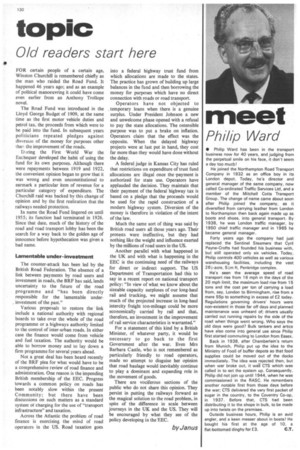meet
Page 412

If you've noticed an error in this article please click here to report it so we can fix it.
Philip Ward
• Philip Ward has been in the transport business now for 40 years, and judging from the perpetual smile on his face, it don't seem a day too much!
He joined the Northampton Road Transport Company in 1932 as an office boy in its London depot. Today, he's director and general manager of the same company, now called Co-ordinated Traffic Services Ltd, and a member of the Mitchell Cotta Transport Group, The change of name came about soon after Philip joined the company, as it diversified from carrying leather from London to Northampton then back again made up as boots and shoes, into general transport. By 1938, he was London traffic manager, by 1950 chief traffic manager and in 1965 he became general manager.
Forty years ago the company had just replaced the Sentinel Steamers that Cyril Payne-Crofts had founded his business with, but still operated only six vehicles. Today, Philip controls 400 vehicles as well as various warehousing facilities, including the vast 261-acre, ft, Penkridge complex.
He's seen the average speed of road transport rise from 16 mph in the days of the 20 mph limit, the maximum load rise from 15 tons and the cost per ton of carrying a load from, say, London to Birmingham, rise from a mere 55p to something in excess of £2 today. Regulations governing drivers' hours were non-existent in those far off days and planned maintenance was unheard of; drivers usually carried out running repairs by the side of the road when.things went wrong. Who says the old days were good? Bulk tankers and artics have also come into general use since Philip first started cornmuting to London from Essex.
Back in 1938, after Chamberlain's return from Munich, Philip put up the idea to the Ministry of Food of buffer depots so that food supplies could be moved out of the docks immediately. The idea was rejected then, but when war broke out, it wag' CTS which was called in to set the system up. Consequently, Philip did not join up until 1944, when he was commissioned in the RASC. He remembers another notable first from those days before the war; CTS delivered the very first packet of sugar in the country, to the Coventry Co-op, in 1937. Before that, CTS had been distributing it to the shops in bulk, to be made up into twists on the premises.
Outside business hours, Philip is an avid angler, and a keen messer about in boats! He bought his first at the age of 10, a flat-bottomed dinghy for £3. C.T.
































































































































































































































































































































































































































































































































